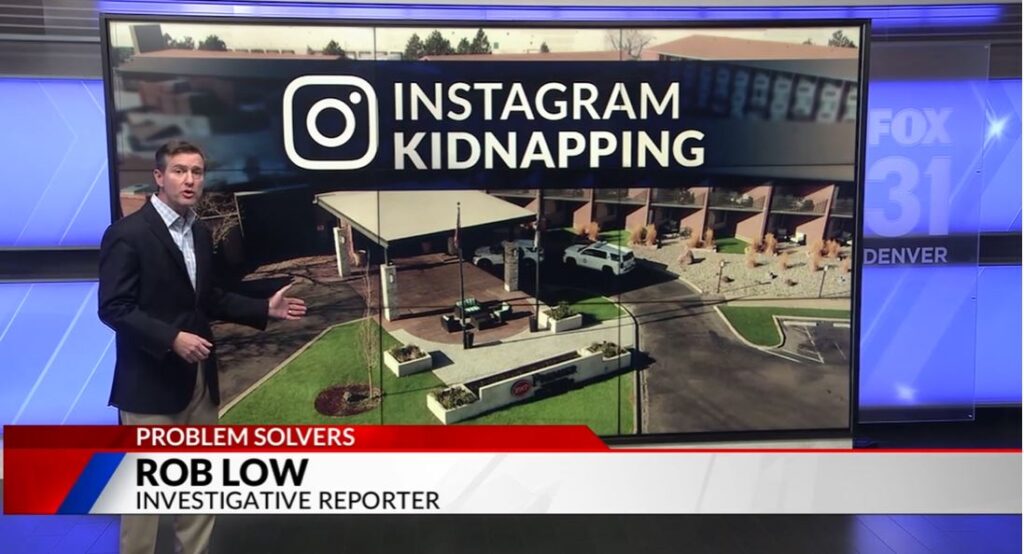By Jeffrey A. Roberts
CFOIC Executive Director
A new Colorado law requires the public disclosure of police body-worn camera footage of incidents “in which there is a complaint of peace officer misconduct.” But what do journalists do when they want to request video, but no one has filed an official complaint?
It turns out just reporting a story may suffice.
That’s what happened last month when FOX31 investigative reporter Rob Low looked into the alleged kidnapping of 25-year-old Jose Salguero-Martinez by five armed men who called themselves bounty hunters and demanded money from Salguero-Martinez’s family to keep him from U.S. Immigration and Customs Enforcement.
According to an arrest affidavit obtained by Low, the family initially called Denver police who “did not see anything suspicious” when they went to a hotel room and found Salguero-Martinez with the men. “The suspects produced some type of paperwork stating they were Bail Bonds(men) which DPD accepted as legitimate. After reviewing the paperwork, DPD departed the area …,” says the affidavit as quoted in Low’s Nov. 23 story.
The family of Salguero-Martinez then contacted Aurora police, who found him at another hotel, “handcuffed to waist chains which were secured by a combination padlock.” Two of the men who called themselves bounty hunters have been charged in Arapahoe County with first- and second-degree kidnapping and three others remain at-large.
Low wanted to know why Denver police officers didn’t do more when they first located Salguero-Martinez, so he requested their body-camera footage.
“When Denver police walked into a hotel room and saw an Hispanic man handcuffed with waist chains … what did they see that didn’t raise red flags to them?” Low said in an interview with the Colorado Freedom of Information Coalition. “What did they hear from these so-called bounty hunters and what paperwork did they review that made them go, nothing to see here? I want to know, and I think the public wants to know.”
Colorado’s new body-cam and dashboard-cam footage law, enacted by House Bill 21-1250 and Senate Bill 20-217, requires the public disclosure of unedited video and audio recordings of incidents “in which there is a complaint of peace officer misconduct by another peace officer, a civilian, or nonprofit organization” within 21 days after a request is made. (If the video “would substantially interfere with or jeopardize an active or ongoing investigation,” the release of footage can be delayed until 45 days from the date of the allegation of misconduct.)
Low told CFOIC he was prepared to make the complaint himself and he received permission to do so from FOX31’s news director. “Typically, we don’t involve ourselves if we don’t have to, but why not? That’s the role of the media. If we see something that’s questionable — and the family’s too scared, they’re not going to do it, and I want some answers — then I’m prepared to do it myself.”
Before filing a complaint, however, Low thought to check whether he’d already triggered a Denver police internal investigation by asking questions. He had.
“Upon learning the circumstances of the alleged kidnapping, Internal Affairs felt it was appropriate to initiate an investigation to look into this situation to determine whether or not DPD policies were followed,” Andrea Webber, records administrator for the Denver Department of Public Safety, wrote in an email to CFOIC this week. “Pursuant to HB 21-1250, the video will be provided to Mr. Low within the 21 days of his request which has not occurred yet.” (Update: Low’s story on the released video.)
Low is a big fan of Colorado’s new body-cam footage law. Since the law went into effect, he’s organized two news media coalitions that successfully fought efforts by Greeley and Sheridan police officers to keep footage from the public. Rachael Johnson, a Colorado-based attorney with the Reporters Committee for Freedom of the Press, represented the news media in both cases.
Body-cam footage provides “a chance to get at the truth,” Low said. “And it’s not just the video. Sometimes the audio is more important than the video because the camera isn’t always pointed in the right place. To hear what is said in real time, at the moment of the incident, people aren’t lying at that time … It’s not perfect, you may not hear everything, but it’s a chance to hear more than you would otherwise have known. To me, that’s absolutely critical.”
Follow the Colorado Freedom of Information Coalition on Twitter @CoFOIC. Like CFOIC’s Facebook page. Do you appreciate the information and resources provided by CFOIC? Please consider making a tax-deductible donation.





